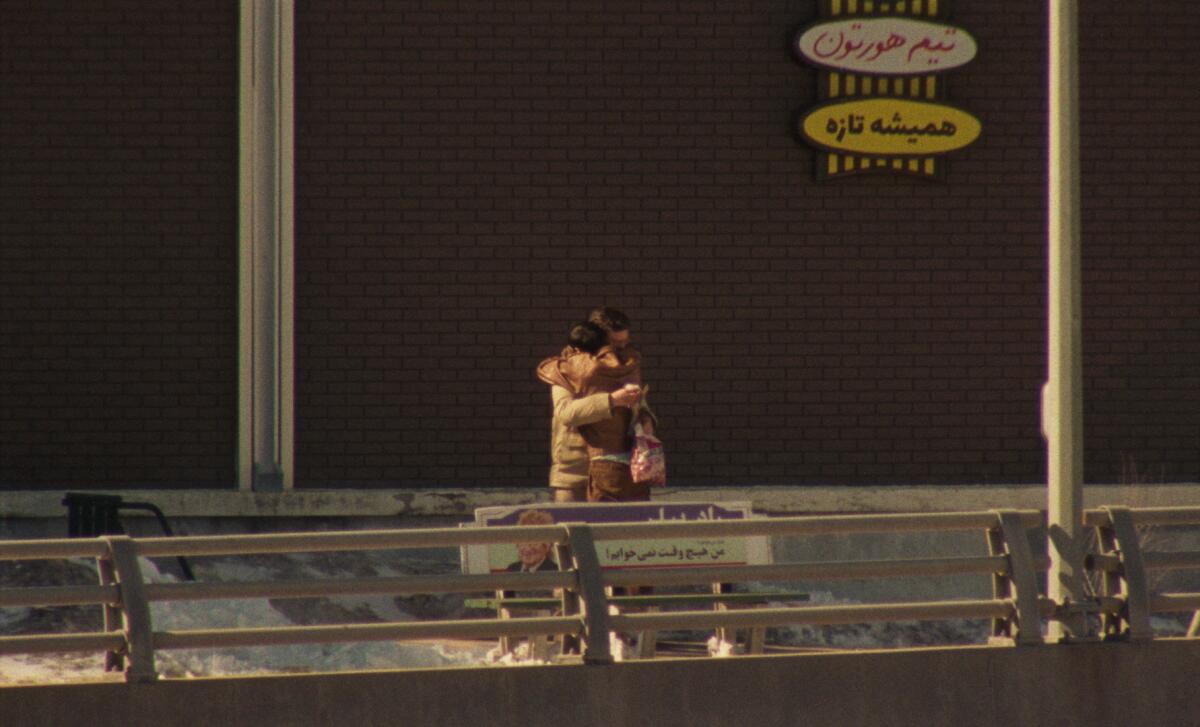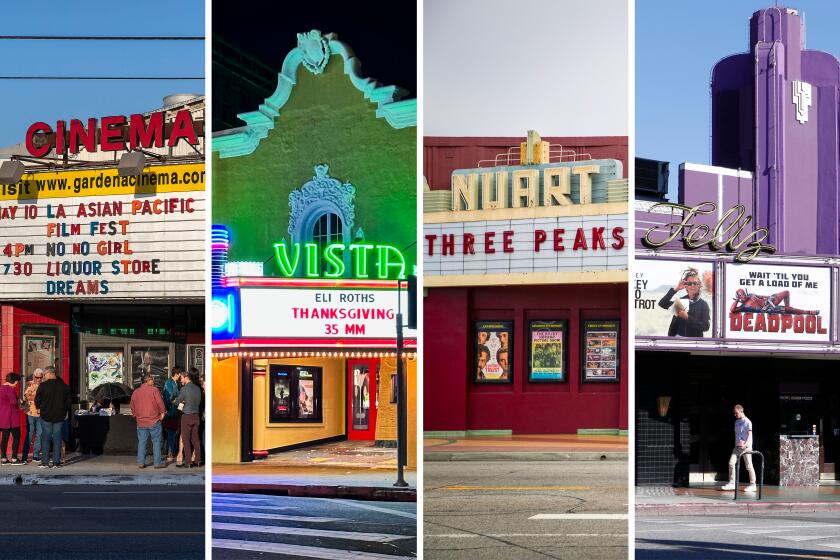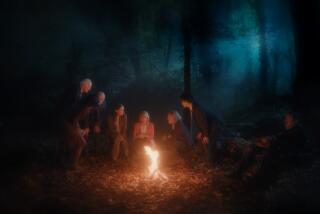Review: In a Winnipeg few will recognize, ‘Universal Language’ speaks from a deep well of humanity

- Share via
Take this four-star tour of a Winnipeg that may never exist. The stony, terse comedy “Universal Language” has all the wind, snow and monotony one might envision in Manitoba, especially for those who’ve yet to make the trip. There are neighborhoods with the deadpan names Brown, Gray and Beige. But the signs on the stores — even the Tim Hortons — are written in Persian, and that’s also the language that every character speaks. There’s not one word in English, not even “Do you speak English?”
The filmmaker Matthew Rankin is a Canadian history scholar who switched tracks from academia to art. Maybe there’s something in the frigid water, as both he and the town’s other beloved cult curio, Guy Maddin, make eccentric odes to their humble homeland. Or maybe there’s something in Winnipeg’s video stores. Their touchstones are silent auteurs and surrealists: F.W. Murnau, Fritz Lang, Luis Buñuel. Not only does it feel that neither ever wanted to be Steven Spielberg, it feels like they’ve never even heard of his movies.
Rankin’s first film, “The Twentieth Century,” was a psychedelic sham biography of former Canadian Prime Minister William Lyon Mackenzie King. Not knowing much about King myself (forgive me, I’m American and freshly aware that our neighbor to the north deserves more respect), I stumbled out of it dazed by outlandish scenes of shoe-sniffing and seal-clubbing, which seemed to be the idea. Rankin himself described it as “one part Canadian Heritage Minute and one part ayahuasca death trip.”
“Universal Language” is more sober but no less strange. (Rankin really has a thing for women with well-groomed mustaches.) These intersecting stories mostly take place over Feb. 29, a fittingly illusive day. The tone is dry and spartan — and funny, too, if you don’t mind snorting at someone whose sons died in a marshmallow-eating competition, or giggling over the sobs of a worker weeping in a cubicle for reasons that go unexplained.
The best movies of 2024 include ‘Anora,’ ‘Smile 2,’ ‘A Real Pain,’ ‘The Seed of the Sacred Fig’ and ‘Dune: Part Two,’ according to our critic Amy Nicholson.
Here on these frostbitten plains, the adults are tired and the children are stoic little beings who crunch around in the snow with the same hassles as everyone else. Sisters Nazgol (Saba Vahedyousefi) and Negin (Rojina Esmaeili, a fabulous glowerer) are trying to find an ice pick so they can chip cash out of a frozen puddle. They need the money to buy spectacles for a friend who lost his in a kerfuffle with a turkey.
Elsewhere, a tour guide named Massoud (Pirouz Nemati) struggles to interest visitors in his favorite things about Winnipeg: an empty mall, an apartment building where “many nice unknown people have lived,” a bus bench with a briefcase that was forgotten in 1978 and the continued unmolestation of which has made it a UNESCO World Heritage Monument to Inter-human Solidarity.
That UNESCO line is delivered in the same neutral cadence as everything else, like one more absurdist joke. But really, that briefcase holds the movie’s soul. Small acts of kindness do more to hold together a society than passports and border checks. Massoud also pauses at a monument to Louis Riel, a 19th-century Canadian revolutionary of Franco-Chipewyan Métis descent, who was executed in 1885 for leading an Indigenous rebellion for civil rights. Riel is real; he’s a bona fide Memorable Manitoban, to poach a title from a Winnipegian blog. But Rankin puts Riel’s face on his movie’s fictional money, too — a pointed production design choice that’s at once a pun on Iran’s currency, the rial, and a way to award value to Riel’s valor.
“Universal Language” isn’t an alternate history of Winnipeg. There’s no backstory here of how this version of the city came to be, except in personal asides. A turkey salesman (Bahram Nabatian) boasts that his family has been in Manitoba for 90 years; a young father (Dara Najmabadi) points to the ice-cream stand where his parents fell in love.
There might be audiences who see this reimagined Winnipeg as a provocation, uncomfortable that Tim Hortons now only appears to serve samovars of tea while street vendors hawk donuts that are as artfully displayed as they might be in Tehran. Rankin presents these demographic changes without argument. No one in the film comments that the city’s population has inverted from one Iranian resident out of 200 to a ratio of 200 to one. (And you never hear the word “immigration” either.) Scouring the movie, I could only find one example of a cultural clash: a woman bringing in a load of air-dried laundry from the snow and struggling to fold a baby onesie that’s frozen stiff.
We’ve mapped out 27 of the best movie theaters in L.A., from the TCL Chinese and the New Beverly to the Alamo Drafthouse and which AMC reigns in Burbank.
The film looks like it was storyboarded on a manila envelope. It’s as fastidious as a desk clerk, with everything gridded and in shades of greige. (The editor Xi Feng cuts from brutalist bricks to a drab lunch tray.) Cinematographer Isabelle Stachtchenko tends to hold still and move only with purpose — her camera seems to be doing tai chi. Calm but never slow, she holds shots just long enough to take in every quietly hilarious detail: a shop stocked with soda bottles of gravy, a kid dressed like Groucho Marx, a man hidden inside a pink Christmas tree who sighs, “My misfortune is unrelenting.”
There’s a confusing beat when, without warning, the film switches cities and rewinds a day. Suddenly, we’re in Montreal to meet another lead character, Matthew (Rankin), on the afternoon he quits his job in Quebec to return to Manitoba, where he was born. This native Winnipegian has been away so long that he doesn’t know that his mother (Danielle Fichaud) has moved homes and found a new Persian family to love.
Rankin has cast himself as the outsider, the solitary depressive and the only Caucasian main role. His Matthew speaks Persian, too, but the movie won’t come out and announce what this character is actually trying to say. Is Matthew untethered from his homeland because of his heritage — or just because he’s personally a bit cold? At the end of his storyline, there’s a disorienting creative decision that nearly addresses the white elephant in the room: the question of who belongs in this community. Really, I think Rankin is using his awkward self to express that belonging isn’t a birthright — it’s an action.
Rankin has said he made the movie in Persian as an homage to the early works of Abbas Kiarostami and the Iranian New Wave of the 1960s and 1970s, which took place halfway around the world from “Jaws.” Take him at his word, sure. But Rankin also knows that language is a Canadian preoccupation. French-speaking Quebec continually debates a divorce from the English-speaking provinces. Here, there’s a running joke in which no one in Montreal knows anything about the rest of the country — that gag is as pointed as Rankin gets about real-world politics. Instead, the film anticipates a question that it doesn’t outright ask or answer: Does it matter what Canadians speak if they’re willing to communicate?
Having planted that idea in the permafrost, “Universal Language” gets rid of dialogue all together. Like the silent directors he adores, Rankin knows when words aren’t needed. One scene takes place at a cemetery that’s holding a crowded funeral for a cat. Except we can’t hear any audio from the mourners over the racket of cars zooming by. It’s the sound of people who can’t pause to appreciate what’s around them.
Even more moving is a nonverbal montage of Matthew arriving at his modest childhood home. This house is no longer his, but the Persian family who lives there ushers him inside like an honored guest. Over a pleasantly discordant score of dreamy electronic chords and twanging banjos, Matthew finds pencil marks charting his growth as a child while these parents fuss over their own new baby. No one says anything but our heart understands: This is how you make strangers feel welcome.
'Universal Language'
In Persian and French, with English subtitles
Not rated
Running time: 1 hour, 29 minutes
Playing: Opens Friday, Feb. 14, AMC Burbank 16
More to Read
Only good movies
Get the Indie Focus newsletter, Mark Olsen's weekly guide to the world of cinema.
You may occasionally receive promotional content from the Los Angeles Times.













